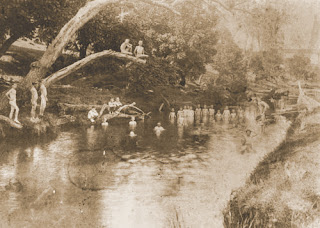Words: Dorothy Hewett
Tune: Traditional (Bold Nelson's Praise)
There was a very simple man,
Honest and quiet, yet he became
The mate of every working man,
And every miner knows his name.
CHORUS
Oh Norman Brown, oh Norman Brown
The murderin' coppers they shot him down,
They shot him down in Rothbury town,
A working man called Norman Brown.
"An honest man," the parson said,
And dropped the clods upon his head,
But honest man or not, he's dead
And that's the end of Norman Brown.
Coal bosses wiped their hands and sighed,
"It is a pity that he died."
It will inflame the countryside,
And all because of Norman Brown.
At pit-top meetings and on strike
In every little mining town,
When miners march for bread and rights
There marches honest Norman Brown.
He thunders at the pit-top strike,
His voice is in the women's tears,
With banner carried shoulder-high
He's singing down the struggling years.
A miner's pick is in his hand,
His song is shouted through the land,
A land that's free and broad and brown,
The land that bred us Norman Brown.
Last chorus
Oh Norman Brown, oh Norman Brown,
The murderin' coppers they shot him down.
They shot him down in Rothbury town,
To live forever ... Norman Brown.
With thanks to Tony Suttor. Recorded on the 1974 album, Man of the Earth- Songs and Ballads of the Australian Mining Industry.
Norman Brown, aged 29 was killed and forty-five others were injured by police in 1929 during what becam known as the Rothbury Riot. These notes from Wikipedia:
In 1929 colliery owners on the Northern New South Wales coalfields combined as the Northern Collieries Association. On Thursday 14 February 1929 the mine employers gave their 9,750 employees 14 days notice, that they (the miners) should accept the following new conditions:
"A wage reduction of 12½ per cent on the contract rates, one shilling ($0.10) a day on the "day wage" rate; all Lodges must give the colliery managers the right to hire and fire without regard to seniority; all Lodges must agree to discontinue pit-top meetings and pit stoppages".
The miners refused to accept these terms, and on Saturday 2 March 1929, all miners were "locked out" of their employment.
In September 1929, the NSW State Parliament introduced an Unlawful Assembly Act designed to suppress the miners, which authorised police to break up any gatherings.
During December 1929 about 4,000 miners were demonstrating against the introduction of non-union labour into the Rothbury mine by the conservative Thomas Bavin State Government who had taken over the colliery. The State Government called in 400 officers from the New South Wales Police from other districts to protect the colliery and allow the entry of non-union labour. On the morning of 16 December the miners had marched to the mine gate led by a pipe band. When the miners charged the gate, they were met by baton charges by the police and hand to hand clashes. Then the police drew their revolvers and shot into the crowd.
This from the Barrier Miner newspaper, 18 December 1930, reporting on the unveiling of the monument to Norman Brown depicted above:
Special trains brought about 2500 men to West Maitland to-day for the unveiling of the monument to the memory of Norman Brown, who was fatally shot in the Rothbury riot last year: A mass meeting had been arranged to follow the ceremony. There was an absence of violence. A brief service was conducted at the Greta Church-of England and at the monument.
Mr. T. Hoare, the miners' northern president, delivered an abusive address before the unveiling of the
monument. His remarks displeased a large section of the crowd.





























